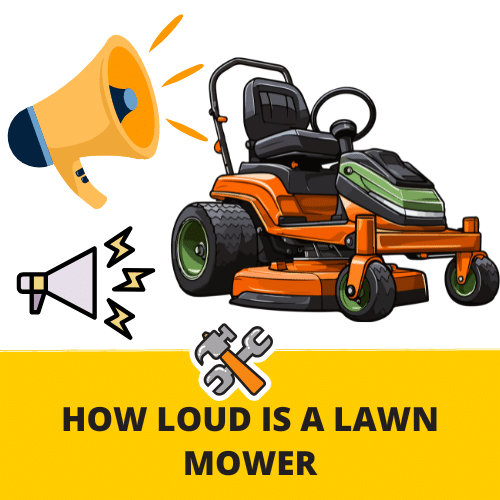Have you ever asked yourself - how loud is a lawn mower?
If that is the case then perfect, you have landed in the right place.
In this ToolsGaloreHQ guide, you will learn.
- Different types of of lawn mower loudness;
- Some fun facts;
- Different ways to make your mower more quite.

Why this Guide on How Loud is a lawn mower
Why is it important to understand the noise levels of lawn mowers? Knowledge of these noise levels empowers individuals like yourself to make informed choices about their lawn care practices.
Recognizing the decibel range helps in selecting equipment that minimizes auditory impact, fostering a more harmonious environment.
It also raises awareness about the potential health risks associated with prolonged exposure to high noise levels, such as Noise-Induced Hearing Loss (NIHL).
Read More:>>> How heavy is your lawn mower
Different lawn mowers in decibels
The noise levels of lawn mowers vary significantly based on their type and design.
Gas-powered mowers typically produce 85 to 100 decibels, while electric mowers range from 56 to 80 decibels, offering a quieter option.
Robotic mowers stand out for their low noise output of 55 to 60 decibels, making them ideal for residential areas where peace is a priority.

Gas-Powered Mowers Noise Levels
How do gas-powered mowers compare in noise levels to other types of lawn equipment?
Gas-powered mowers typically generate noise levels ranging from 85 to 100 decibels, placing them among the loudest options available. This noise is comparable to heavy traffic or even motorcycles, making ear protection advisable for users.
Riding mowers, which can reach noise levels of 88 to 105 dB, further amplify the auditory impact, often exceeding the threshold for safe exposure.
In contrast, electric mowers operate at a quieter range of 56 to 80 dB, promoting a more serene lawn care experience.
As the quest for liberation from excessive noise continues, understanding these differences empowers individuals to make informed choices for their auditory health and community peace.
Read More:>>> Manually find interesting ways of keep your lawn tidy
Electric Mowers Sound Comparison
Comparing the noise levels of electric mowers to their gas-powered counterparts reveals a significant difference in sound intensity.
Electric mowers typically operate at 56 to 80 decibels, resembling the gentle hum of a washing machine. In contrast, gas-powered mowers emit noise levels ranging from 85 to 100 decibels, comparable to the roar of heavy traffic.
This stark contrast not only enhances the mowing experience but also fosters a more peaceful environment. The quieter operation of electric mowers liberates users from the burdens of excessive noise, allowing them to maintain their lawns without disturbing the tranquility of their neighborhoods.
This transition to quieter technology promotes harmony, making electric mowers a compelling choice for the conscious homeowner.
Robotic Mowers Quiet Operation
While traditional lawn mowers can reach noise levels that disrupt both the user and the surrounding environment, robotic mowers offer a remarkably quieter alternative. Operating at just 55 to 60 decibels, robotic mowers create a serene mowing experience, allowing users the freedom to enjoy their surroundings without interruption. This reduced noise level makes them ideal for residential areas, promoting harmony within the community.
MOWER TYPE | Decibel range (DB) | noise Level Comparison |
|---|---|---|
Robotic Mowers | 55–60 | Quieter than a conversation |
Electric Mowers | 70–80 | Similar to a vacuum cleaner |
Gas-Powered Mowers | 85–100 | Comparable to heavy traffic |
Riding Mowers | 88–96 | Like a motorcycle |
Push Mowers | 86–92 | Requires ear protection |
Factors Influencing Noise Levels
Various factors influence the noise levels produced by different types of lawn mowers, significantly impacting both user experience and community peace.
Engine size and power are crucial; larger engines typically generate more noise, while blade design and speed also play a role, with faster blades creating higher sound levels.
The build quality of the mower can affect noise, as cheaper materials may vibrate more, amplifying sound.
Age and maintenance are vital; well-maintained mowers operate quietly, whereas wear and tear lead to louder operation.
Understanding these factors allows users to make informed choices, seeking quieter options to promote a more harmonious environment and enhance their mowing experience.
Embracing better technology can liberate individuals from excessive noise pollution.
Read More:>>> Aerate your lawn quickly and effectively
Fun facts about the loudest lawn mower
Although many lawn mowers produce significant noise levels, gas-powered models stand out as some of the loudest available, often reaching between 85 and 100 decibels.
Among these, the riding lawn mower is particularly notorious, with some models exceeding 100 decibels, comparable to the roar of a motorcycle.
Interestingly, the loudest lawn mower recorded is the 2013 Stiga Park Pro 540 IX, which audibly surpasses conventional limits.
These machines, while powerful, can disrupt peace and community tranquility.
The relentless noise they produce can serve as a reminder of the balance between efficiency and serenity, encouraging users to seek quieter alternatives that liberate them from the overwhelming clamor of traditional mowing.
How to quite lawn mower down
To reduce the noise level of a lawn mower effectively, several strategies can be employed that focus on both equipment choice and maintenance practices.
Selecting quieter options, such as electric or robotic mowers, can significantly diminish noise output. Regular maintenance, including sharpening blades and checking engine components, ensures optimal performance and quieter operation.
Mowing during dry conditions and avoiding overgrown grass can further minimize noise, as excessive effort amplifies sound. Creating natural barriers, such as hedges or fences, can absorb sound waves, reducing their impact on the surrounding area.
Additionally, utilizing personal ear protection can shield users from harmful noise levels, promoting a more peaceful gardening experience. Embracing these practices fosters both personal well-being and community harmony.
Final Thoughts on how loud is a lawn mower
In conclusion, understanding the noise levels of various lawn mowers is crucial for making informed choices that promote both personal comfort and community peace.
With gas-powered models reaching higher decibels akin to heavy traffic, while electric and robotic mowers offer quieter alternatives, homeowners can select equipment that suits their needs.
By considering the noise factor, individuals can maintain their lawns effectively without disturbing their surroundings, contributing to a more harmonious residential environment.





